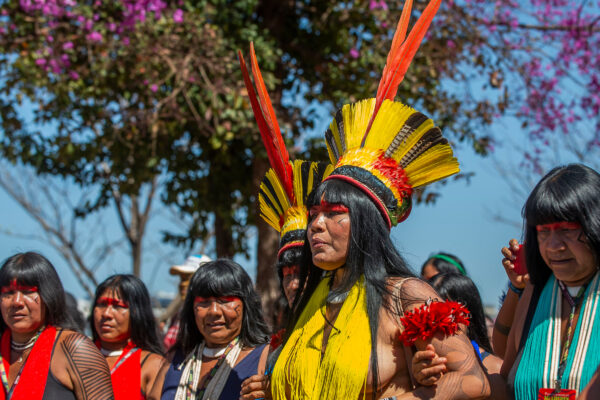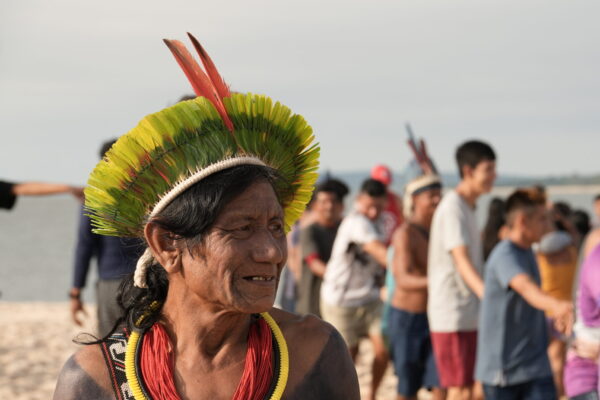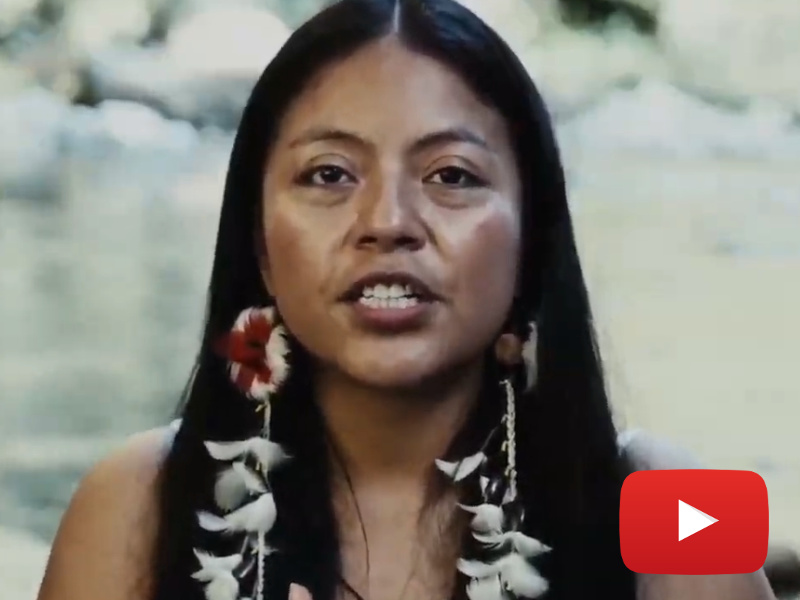Photos and video available here
Santarém, Brazil – Today hundreds of Indigenous people and allies staged a daring protest, temporarily blocking barge shipping on the Amazon rainforest’s lower Tapajós River, to denounce the destructive impacts and growing threats of Brazil’s export-oriented agribusiness model in the region. Led by the Tupinambá Indigenous people, the “Ancestral Outcry” action demanded the cancellation of the Ferrogrão “grain railway” mega-project which would drive massive deforestation, rights abuses, and the destruction of this key Amazonian waterway.
This morning, Indigenous leaders from the Tupinambá, Munduruku, Arapiun, Kumaruara, Jaraqui, Tapajó, Tapuia, Apiaka, Kayapó communities gathered alongside representatives from dozens of local organizations assembled on the banks of the Tapajós and read a statement entitled “Letter from the Tapajós to the World.”
Holding signs denouncing Ferrogrão and its global commodity-trading proponents such as US-based Cargill, they motored canoes into the middle of the river to block the traffic of barges transporting soy and other commodities, boarding several barges with protest signs such as “Don’t let Ferrogrão destroy the Tapajós.” The action also featured a mock soy barge covered with the logos of agribusiness companies vying to aggressively expand commodity production and export to the detriment of the Amazon and forest communities.
“They are preventing us from fishing and killing the Tapajós River to export soybeans to China and Europe. If Ferrogrão is built, the situation will only get worse,” said Raquel Tupinambá, coordinator of the Tupinambá Indigenous Council (CITUPI). “Ferrogrão will increase deforestation for more soy production and also intensify the river’s destruction because they want to carve into the riverbed and blast the rocks, which are extremely sacred for us. The railway will heighten the impacts of a logistics corridor that already adversely affects us, and we have yet to even be consulted.”
“The fact that the Ferrogrão project is being prioritized by sectors of the federal government shows our rights continue to be ignored,” said Karanhin Metuktire, a Kayapó leader and representative of the Raoni Institute. “They want to build this railroad without respecting our existence and the consultation protocols of various Indigenous peoples, as required by Convention 169 of the International Labor Organization. Each territory has its own rules and ways of making decisions, and this needs to be respected.”
Initiated at the request of Cargill and other major agribusiness companies, the Ferrogrão mega-project (EF-170) is intended to expand the transportation of soybeans and corn from Brazil’s west-central region. The railroad would cut through the Amazon to connect to ports on the Tapajós River and is projected to drive more than 2,000 square kilometers of deforestation in the rainforest. According to preliminary studies presented by Brazil’s Ministry of Transport, the resulting surge in grain exports would lead to a sixfold increase in river-based transport by 2049, posing major threats to the waterway’s vital ecosystems and those who depend on them for their survival.
Today’s protest coincides with the COP 29 climate summit in Azerbaijan where Brazil is touting its climate credentials, underscoring the importance of drawing global attention to the devastating socio-environmental and climate impacts of the country’s reckless expansion of agribusiness alongside the development of related export-oriented infrastructure.
“Our action today is meant to send a message to Brazil’s federal government: Ferrogrão’s destruction would jump its tracks, deeply affecting the Tapajós River and beyond,” said Pedro Charbel, Brazil campaign advisor at Amazon Watch. “Brazil will host COP30 next year here in Pará state, and the world is watching. We cannot give in to the interests of Cargill and other large corporations. We must cancel the Ferrogrão project for the future of our planet.”
Today’s protest action was organized by the #NoFerrogrão Alliance, which is made up of 39 members in Brazil and internationally including the Association of Brazil’s Indigenous Peoples (APIB), the Karuana Association, the Montanha and Mangabal Association, the Wakoborun Munduruku Women’s Association, the Iakiô Association, the Pariri Association, the Xavante Association, Amazon Watch, Avaaz, the Pastoral Land Commission of Itaituba (CPT), the Indigenist Missionary Council of Santarém (CIMI-STM), the Indigenist Missionary Council of Mato Grosso (CIMI-MT), the Tapajós e Arapiuns Indigenous Council (CITA), the Tupinambá Indigenous Council (CITUPI), the Planalto Apiaká and Munduruku Council, the Coordination of Indigenous Organizations of the Brazilian Amazon (COIAB), FASE Amazon Program, the Federation of Mato Grosso’s Indigenous Peoples and Organizations (FEPOIMT), Greenpeace Brazil, the Infrastructure and Social Justice Working Group, the Institute of Socio-environmental Studies (INESC), the Kabu Institute, the Raoni Institute, the Maparajuba Human Rights Consultancy, the Small Farmers Movement (MPA), the Movement of Dam-affected People (MAB), the Tapajós Alive Movement, the Xingu Alive Movement, the Arikico Munduruku Educators Organization, the Operation Native Amazon (OPAN), the Social-environmental Observatory of Mato Grosso (Observa MT), the Socialism and Liberty Party (PSOL), the Cerrado Network, the Trairão Agroecology Network, the Trairão Rural Workers Union (STTR), Pan-Amazonian Ecclesial Network (REPAN- Brazil), the Santarém REPAN Committee, Stand.Earth, and Terra de Direitos.













